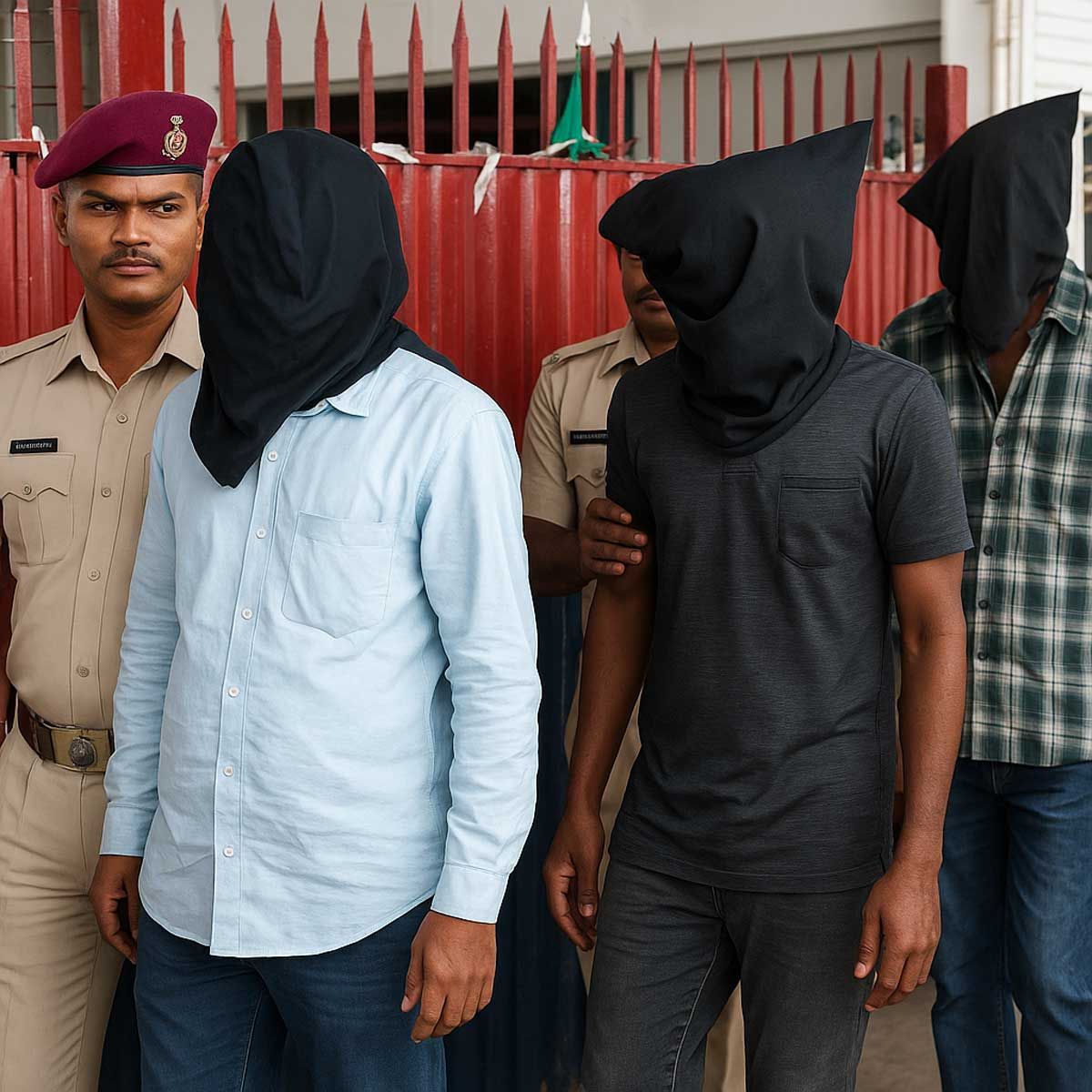More Coverage
Twitter Coverage
Satyaagrah
Written on
Satyaagrah
Written on
Satyaagrah
Written on
Satyaagrah
Written on
Satyaagrah
Written on
JOIN SATYAAGRAH SOCIAL MEDIA
"Trapping a Scientist": A Kerala cop maliciously framed ISRO scientist Nambi Narayanan in an espionage case after a Maldivian woman rejected his advances, leading to intense surveillance of innocents, and a Supreme Court-mandated Rs 50 lakh compensation

On July 10th, the Central Bureau of Investigation (CBI) presented a startling revelation to a Thiruvananthapuram court regarding the notorious 1994 ISRO espionage case. The agency alleged that the case was a deliberate fabrication by a senior officer of the Kerala police, aimed at illegally detaining a Maldivian woman who had spurned his romantic propositions. The implications of this case stretched far, erroneously entangling ISRO scientist Nambi Narayanan, who was unjustly accused in the process.
|
According to the detailed chargesheet filed by the CBI, the then special branch officer, S Vijayan, orchestrated the entire scenario as a vindictive act following the rejection of his romantic overtures by Mariyam Rasheeda, a Maldivian national. The CBI's investigation highlighted that S Vijayan went to the extent of confiscating Rasheeda’s travel documents and airline tickets. This was an effort by Vijayan to prevent Rasheeda from leaving India, effectively stranding her within the country under false pretenses.
This misuse of authority by Vijayan, who eventually retired from the police force as a Superintendent of Police (SP), has drawn severe scrutiny.
The chargesheet elaborates on how the investigation took a sinister turn after S Vijayan linked Mariyam Rasheeda to ISRO scientist D Shasikumaran. This supposed connection led Kerala Police to intensify their scrutiny, placing Rasheeda and her Maldivian friend, Fauzia Hasan, under close surveillance. Despite these measures, the involvement of higher authorities became inevitable.
The narrative provided by the Kerala Police prompted them to alert the Subsidiary Intelligence Bureau (SIB) about the potential threat posed by these foreign nationals. However, upon thorough investigation by IB officers, no evidence of illicit activities was discovered. Nonetheless, Rasheeda found herself arrested under the Foreigners Act for overstaying her visa—a move orchestrated with the awareness and possible complicity of the then-Commissioner of Police in Thiruvananthapuram and the SIB Deputy Director.
As Rasheeda's period of lawful custody neared its conclusion, Vijayan took a further step into deception. He allegedly produced a fabricated report, which wrongfully accused both Rasheeda and Hasan of breaching the Official Secrets Act. This act of falsification led directly to the instigation of an espionage case. The case rapidly escalated and was subsequently handed over to a Special Investigation Team (SIT). Under the direction of the SIT, the situation worsened as four ISRO scientists, including the well-regarded Nambi Narayanan, were arrested, marking a significant and controversial chapter in the annals of Indian law enforcement and judicial proceedings.
The complexities of the ISRO espionage case continue to unfold as the Central Bureau of Investigation (CBI) chargesheet points out how initial wrongdoings against Nambi Narayanan and others were exacerbated by subsequent fabricated allegations. The narrative of the investigation as presented by the CBI shows a deepening of the conspiracy over time.
|
In a significant development, the CBI's final report recommends the prosecution of several high-ranking officials. These include former Director Generals of Police (DGPs) R B Sreekumar and Siby Mathews, former SPs S Vijayan and K K Joshua, and former intelligence officer P S Jayaprakash. The allegations against these individuals are severe, underlining their purported roles in orchestrating and perpetuating the false charges laid against Narayanan and his colleagues.
The specifics of the legal charges are particularly damning. The accused have been booked under various sections of the Indian Penal Code, encompassing criminal conspiracy (120B), wrongful confinement (342), voluntarily causing hurt (323), voluntarily causing hurt to extract a confession (330), public servant framing an incorrect document (167), giving false evidence (193), and outrage of the modesty of a woman (354). These charges sketch a portrait of systematic abuse of power and legal manipulations.
However, the CBI stopped short of recommending prosecution for thirteen others, including then IB officers and Kerala Police officers, citing a lack of sufficient evidence to proceed legally against them.
In response to these developments, Nambi Narayanan's reaction was measured and introspective. Speaking on Wednesday, he expressed a sense of closure regarding his personal involvement in the case, emphasizing that he had established his innocence. Narayanan mentioned he harbors no desire for the imprisonment or apologies from those who wronged him, though he admitted that an acknowledgment of their mistakes by the accused officers would have been satisfying.
The narrative surrounding the ISRO espionage saga saw a significant turn based on the findings from the CBI' 1996 investigation. The CBI's conclusions at the time starkly highlighted the injustices meted out to Nambi Narayanan and others, firmly stating that the cases against them were baseless and fabricated. This was a crucial acknowledgment of the flawed processes that led to severe repercussions for the involved parties.
|
In its detailed analysis, the CBI criticized the actions of the IB officials involved, pointing out that their approach to the ISRO case was markedly unprofessional. The report explicitly stated that this team was "privy to the arrest of six innocent persons, thereby causing them immense mental and physical agony." Such a damning indictment underscored the grievous errors made during the initial investigations and the profound impact these had on the accused individuals.
Further, the CBI censured Srikumar explicitly, indicting him for "failing in their duty to conduct the inquiry in an objective and fair manner." This highlighted a significant breach of professional responsibility and suggested a biased investigation process that had dire consequences for those unjustly accused.
In response to these unsettling revelations, the Supreme Court took decisive action in 2018. Recognizing the need for accountability and justice, it ordered a high-level investigation specifically targeting the role of the police officials who erred in their duties in the Nambi Narayanan espionage case. On September 14, 2018, a three-member committee was appointed to delve deeper into these allegations. Simultaneously, the Supreme Court directed the Kerala government to compensate Nambi Narayanan with Rs 50 lakh for the "extreme humiliation" he suffered due to the mishandled investigation.
This move by the Supreme Court was not just about rectifying past wrongs but also about restoring the dignity of a scientist who had endured years of unnecessary hardship. It marked a pivotal moment in India's judicial history, underlining the importance of fair and unbiased investigations and the need for reparation when justice systems fail the very people they are designed to protect.
 Support Us
Support Us
Satyagraha was born from the heart of our land, with an undying aim to unveil the true essence of Bharat. It seeks to illuminate the hidden tales of our valiant freedom fighters and the rich chronicles that haven't yet sung their complete melody in the mainstream.
While platforms like NDTV and 'The Wire' effortlessly garner funds under the banner of safeguarding democracy, we at Satyagraha walk a different path. Our strength and resonance come from you. In this journey to weave a stronger Bharat, every little contribution amplifies our voice. Let's come together, contribute as you can, and champion the true spirit of our nation.
 |  |  |
| ICICI Bank of Satyaagrah | Razorpay Bank of Satyaagrah | PayPal Bank of Satyaagrah - For International Payments |
If all above doesn't work, then try the LINK below:
Please share the article on other platforms
DISCLAIMER: The author is solely responsible for the views expressed in this article. The author carries the responsibility for citing and/or licensing of images utilized within the text. The website also frequently uses non-commercial images for representational purposes only in line with the article. We are not responsible for the authenticity of such images. If some images have a copyright issue, we request the person/entity to contact us at This email address is being protected from spambots. You need JavaScript enabled to view it. and we will take the necessary actions to resolve the issue.
Related Articles
- "In a monumental stride, Bharat ancient roots meet its space-age achievements under Modi": With 'Angad's footstep' on the Moon and landmarks named 'Shiv Shakti' & 'Tiranga', the nation beams with pride as Aug 23 is now immortalized as National Space Day
- ISRO successfully tested the Gaganyaan Service Module Propulsion System (SMPS) on July 19, 2023 at ISRO Propulsion Complex (IPRC) , Mahendragiri
- "Story of India’s herculean scuffle to get the Cryogenic Engine": India's heavy lift ambitions and ultra-low-cost model could put the likes of NASA out of business, an eventuality that the USA tried to delay India’s space program as long as it can
- "Cosmic camaraderie": India and Russia's space partnership ignites after Chandrayaan-3's lunar triumph, a legacy of cosmic camaraderie—from Aryabhata to Gaganyaan—heralds a new era of interstellar collaboration and boundless cosmic possibilities
- "There is no law except the law that there is no law": Samudrayaan with Matsya 6000 is set to unlock the ocean's enigmatic heart, heralding a new era in harnessing marine resources for a sustainable future symbolizing a big leap in deep-sea exploration
- "Ambition is path to success. Persistence is the vehicle you arrive in": India scripted history as ISRO successfully launches 36 OneWeb broadband satellites in heaviest LVM3-M2 rocket on its debut commercial mission, all satellites separated successfully
- India's audacious tryst with the cosmos continues as Chandrayaan-3 flawlessly kisses the Moon's South Pole, a precise Nataraja dance of science, ambition, and national pride, this milestone heralds a new dawn in lunar exploration, Bravo ISRO 🌒🚀
- "And the winds and the waves are always on the side of the ablest navigators": ISRO successfully launched GSLV-F12/NVS-01 Mission from SDSC-SHAR, Sriharikota, NVS-01 first of the India's second-generation NavIC satellites that accompany enhanced features
- "It is not enough to stare up the steps, we must step up the stairs": On 2nd April 2023, Vikram Sarabhai Space Centre (ISRO) at Thiruvanthapuram, IAF "Chinook" helicopter lifted an aircraft and left it in the sky to fly for high-speed unmanned landing
- "Historic launch of Chandrayaan-3": A lunar mission set to make India the fourth nation to land on the moon, encompassing technological marvel, scientific discovery, and national pride, carving out India's place in the annals of space exploration
- "India's cosmic journey: From moonbeams to sunrays": ISRO's landmark Aditya-L1 mission set to launch, promising 24x7 Sun surveillance, aiming to decode solar mysteries, it will enhance our understanding of space weather and the profound Sun-Earth dynamics
- "The good thing about science is that it's true whether or not you believe in it": Study conducted by Stanford University & Elsevier enlisted Acharya Balkrishna among top 2% of world scientists, PRI relentlessly engaged in making Ayurveda a modern trend
- Mysterious death of Homi Bhabha and new trend started of top Indian scientists dying under mysterious circumstances
- "Achievement in space, politics on Earth": While ISRO's Chandrayaan-3 etches a new chapter in space history, the Congress's rush for credit speaks volumes, amidst lunar triumphs, memories of overlooked funding pleas during the UPA era cast long shadows
- Group of Wuhan scientists have sounded alarm bells of a new variant ‘NeoCoV’ which is highly infectious and virulent, leading to the death of 1 in 3 patients if infected




























